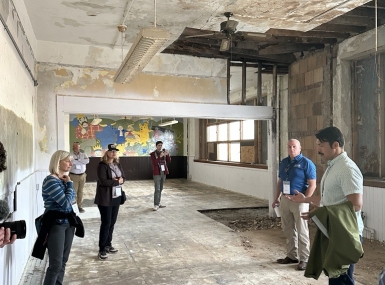Rural issues at heart of RAC meeting

Rural housing, opioid supply fix, USDA topics at RAC symposium in Wise County, Texas
For the first time in eight years, NACo’s Rural Action Caucus (RAC) met for its annual symposium — this year in Wise County, Texas — with a new secretary leading the Department of Agriculture.
Speakers addressed areas of concern to rural counties, including Agriculture Secretary Sonny Perdue’s priorities for the department, strategies to reduce opioid drug addiction and rural housing.
It started from close to the top. Jannine Miller, Perdue’s senior adviser for rural infrastructure, updated members on what the department is doing, or getting out of the way of, to enhance rural prosperity — President Trump’s charge for USDA.
Perdue has established an undersecretary for trade and reassigned the assistant secretary for rural development to report directly to him. That all reflects Perdue’s attitude toward government, and Miller alluded to his restructuring of the Georgia DMV while he was governor, which resulted in reducing waiting times despite a smaller budget.
“It was all about the customer, and that’s what Secretary Perdue is doing at USDA,” she said. “He’s refocusing all of that department on the customer.”
Miller said barges, which move about 50 million tons of crops per year, are an underappreciated shipping mode that will become more influential.
“This is important because it puts price competition on the railroads, and anytime the railroads have to compete on price, everybody wins,” she said.
She emphasized the need for a built-out broadband internet network that can support use by rural areas.
“Internet is about to be the most important infrastructure,” she said. “E-commerce is one of the biggest growth areas for rural small businesses and farms,” and it supported 70,000 jobs and $24 billion in economic impact in 2015.
“Nationwide, e-commerce had a 17-perent growth last year,” she said. “Rural America has to be a part of that. It can’t be unless there’s high speed internet everywhere.”
Miller solicited input for the Interagency Task Force on Agriculture and Rural Prosperity at tinyurl.com/ruralprosperity. The submissions will not be made public.
Health
Recent years have seen an increased disparity in mortality between rural and non-rural areas. Much of the reason falls to social determinants of health, classified as economic stability, education, social and community context, health and health care and neighborhood, and built environment.
Emily Phillips, of the NORC Walsh Center for Rural Health, outlined some of the issues rural counties must address. The University of Chicago’s Walsh Center was commissioned by the Robert Wood Johnson Foundation to develop recommendations for foundation involvement in rural health. The Walsh Center’s team performed field studies on rural counties on the U.S.-Mexico border, the Mississippi Delta, the Northeast and the Upper Midwest.
“There are far, far more rural persistent poverty counties than urban,” she said, “This, we know, has significant impacts on quality of life and health because a lot of these issues are intergenerational issues.”
In addition to continuing study on rural areas by foundations, Phillips’s recommendations include identifying and developing rural leadership; fostering collaboration between sectors of government, not just health and human services; developing messaging specific to rural communities; offering funding and organizational support to existing local and regional programs, and supporting general community development in rural areas.
Opioid drugs
A key facet to reducing the number of opioid dependencies could reside in workers’ compensation programs and a change Texas put in place six years ago. That’s what DC Campbell, research director at Texas Department of Insurance, told RAC members.
“We have a problem and it can be fixed,” he said. “Our experience in the workers comp system will drive that message. We can see what can happen in a very short period of time if you have the right laws, right rules and right motivations behind them.”
As of Sept. 1, 2011, the state’s insurance department established a list of drugs that can be prescribed in connection with workers’ compensation claims.
A 2016 study found that in addition to reducing drug costs by 15 percent, including an 80 percent drop in the costs of drugs that were no longer recommended and needed an advanced rationale by a doctor to prescribe, the change led to an 81-percent drop in opioid prescriptions.
That drop, Campbell said, reduces the number of excess opioid pills out in the world and the number of people who are prescribed those medications when others will suffice. That would shrink the gateway to opioid dependence and addiction.
Housing
David Lipsetz, a senior fellow at the Housing Assistance Council, addressed the public role in housing in rural areas and expressed his concern for the federal budget requests that would eliminate funding for several USDA housing programs.
The nature of housing lends itself to political arena.
“Housing work is not rocket science, it’s art,” he said. “We don’t have immutable laws of gravity and all those fancy things, it’s personal relationships. So, if you’re not connected to the person who can build the next apartment building in your town, you have got to send a note.”
No amount of deregulation or market forces, he said, will make up for the need for safe rural housing. As a result, he was struck by the stark appearance of zeros in the FY2018 budget requests for such programs as the Single Family Housing Direct Home Loans, Section 542 Rural Housing Vouchers and Farm Labor Housing Grants.
“Someone has to step in and assist these communities in housing the population,” he said. Not only is there a need, there is an appropriate role in rural geographies where there is no established market to have public intervention in these markets.
“To draw down many of these programs is going to be extremely challenging. We are talking about geographies that don’t have functional housing available.”
Attachments
Related News

Congress Passes Landmark Outdoor Recreation Package
Lawmakers passed the bipartisan EXPLORE Act (H.R.6492) on December 19 to boost outdoor recreation opportunities on public lands for county residents and visitors and aid gateway communities

Senate Agriculture Committee introduces 2024 Farm Bill
On November 18, Senate Agriculture, Nutrition and Forestry Committee Chairwoman Debbie Stabenow introduced the Rural Prosperity and Food Security Act, the Senate’s version of the 2024 Farm Bill.

Co-locating community: Rural revitalization in Fayette and Greenbrier Counties
This fall, NACo’s BRECC Commitment Coalition convened 20 leaders supporting coal-impacted communities for a three-day peer exchange to explore revitalization efforts across Fayette County and Greenbrier County, W.Va.
